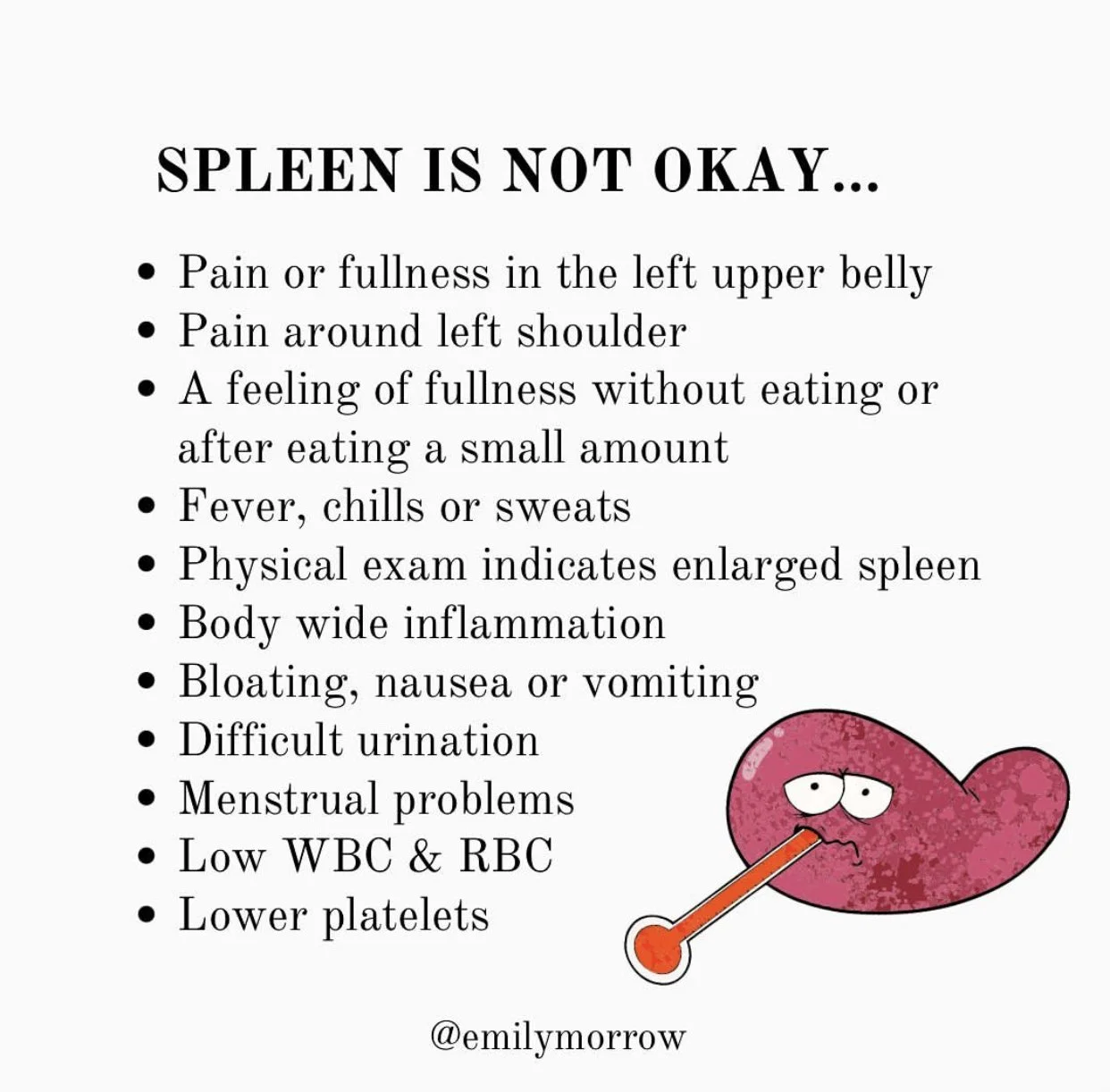The Adrenals: Roles, Signs of Dysfunction & Support
The adrenals are two small, triangular shaped glands that sit on top of the kidneys. Adrenal glands produce hormones that help regulate the metabolism, immune system, blood pressure, response to stress and other essential functions.
The Adrenals
John Hopkins Medicine provides the following information about the Adrenal Glands:
Adrenal glands, also known as suprarenal glands, are small, triangular-shaped glands located on top of both kidneys.
Adrenal glands produce hormones that help regulate your metabolism, immune system, blood pressure, response to stress and other essential functions.
Adrenal glands are composed of two parts — the cortex and the medulla — which are each responsible for producing different hormones.
The adrenal cortex—the outer part of the gland—produces hormones that are vital to life, such as cortisol (the hormone that helps regulate metabolism and helps the body respond to stress) and aldosterone (which helps control blood pressure).
The adrenal medulla—the inner part of the gland—produces nonessential hormones like adrenaline (the hormone that helps the body react to stress).
When adrenal glands don’t produce enough hormones, this can lead to adrenal insufficiency (Addison’s disease).
Adrenal glands may develop nodules that can be benign or malignant, which can potentially produce excessive amounts of certain hormones leading to various health issues.
The role of the adrenal glands in your body is to release certain hormones directly into the bloodstream. Many of these hormones have to do with how the body responds to stress, and some are vital to existence. Both parts of the adrenal glands — the adrenal cortex and the adrenal medulla — perform distinct and separate functions.
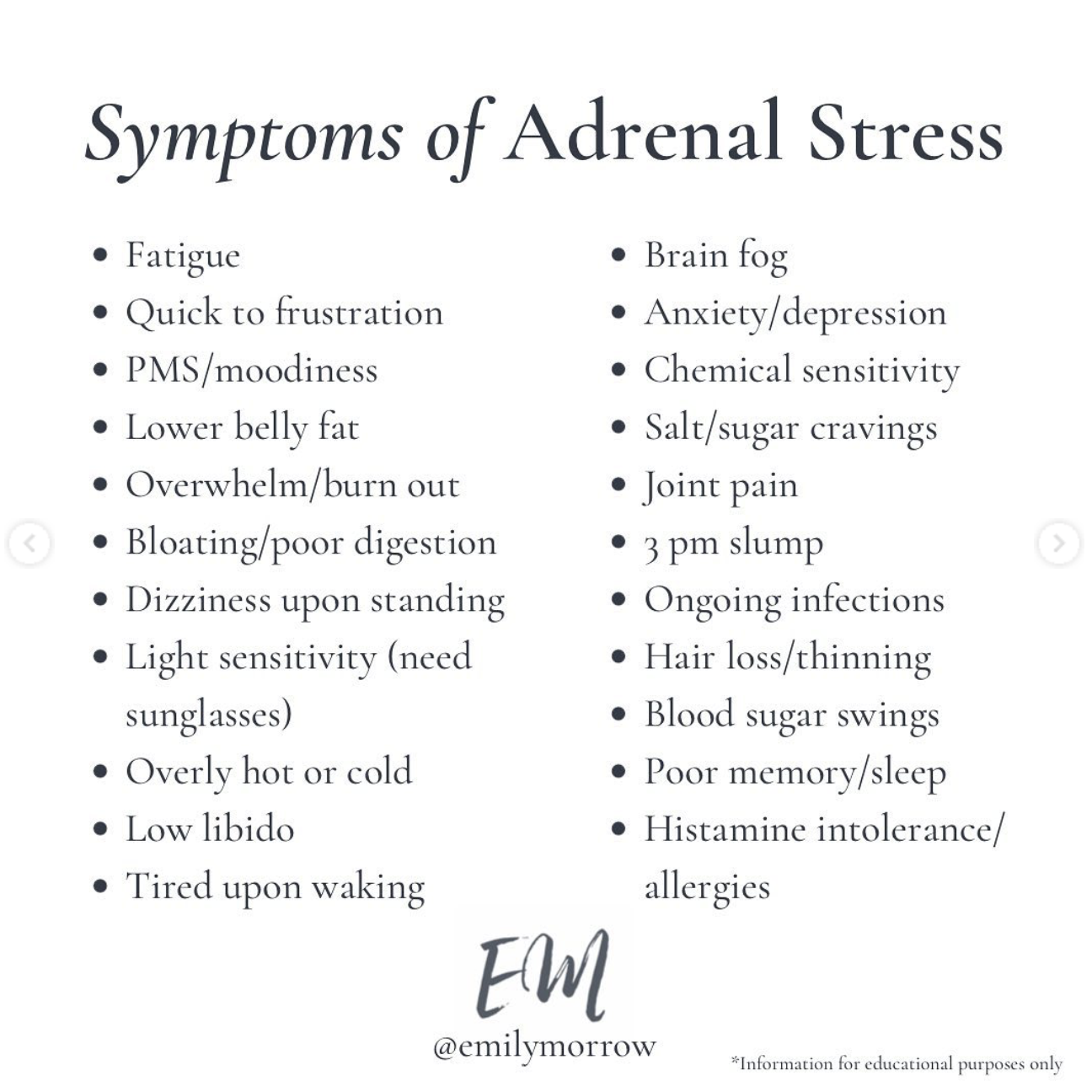
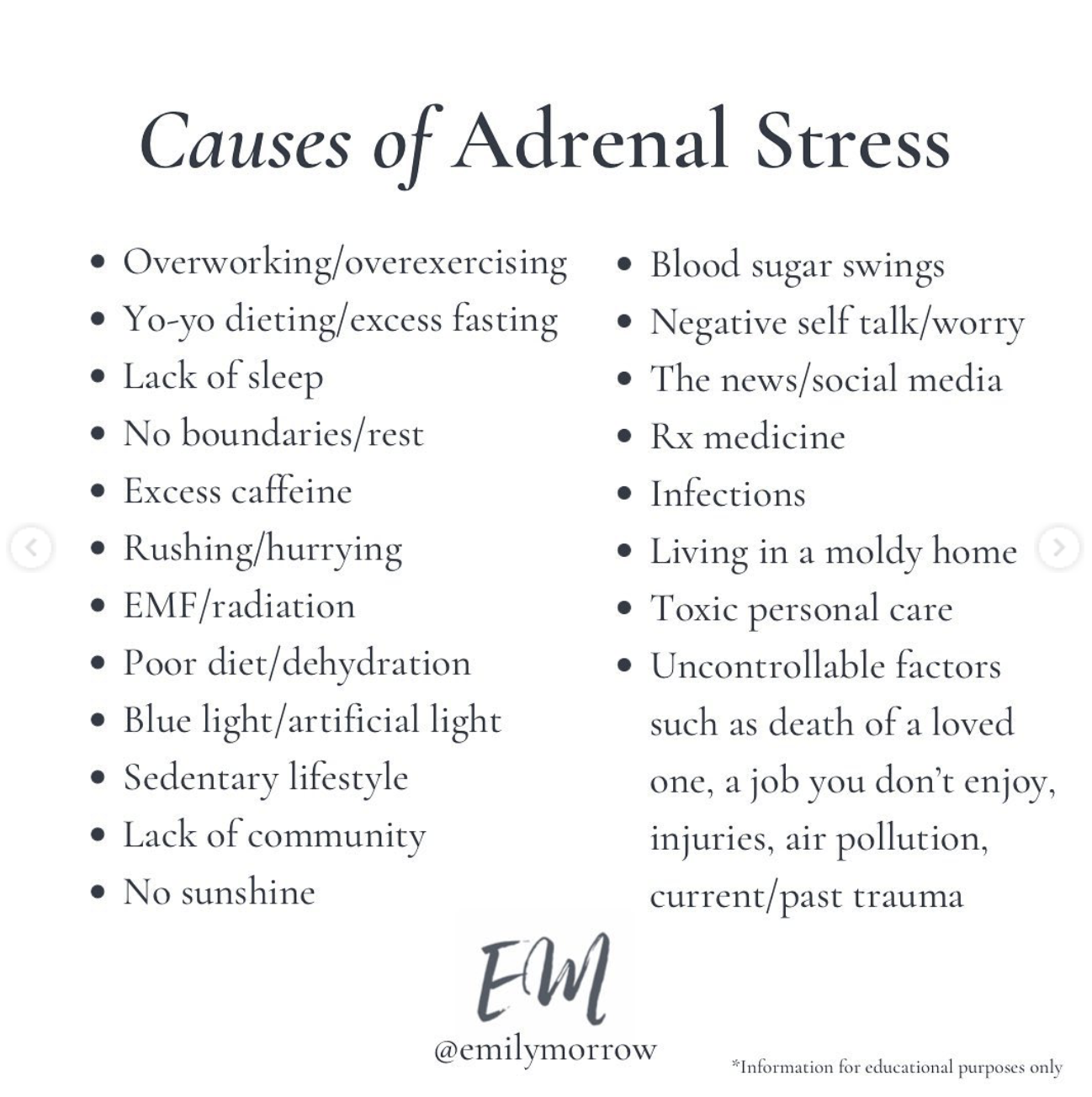
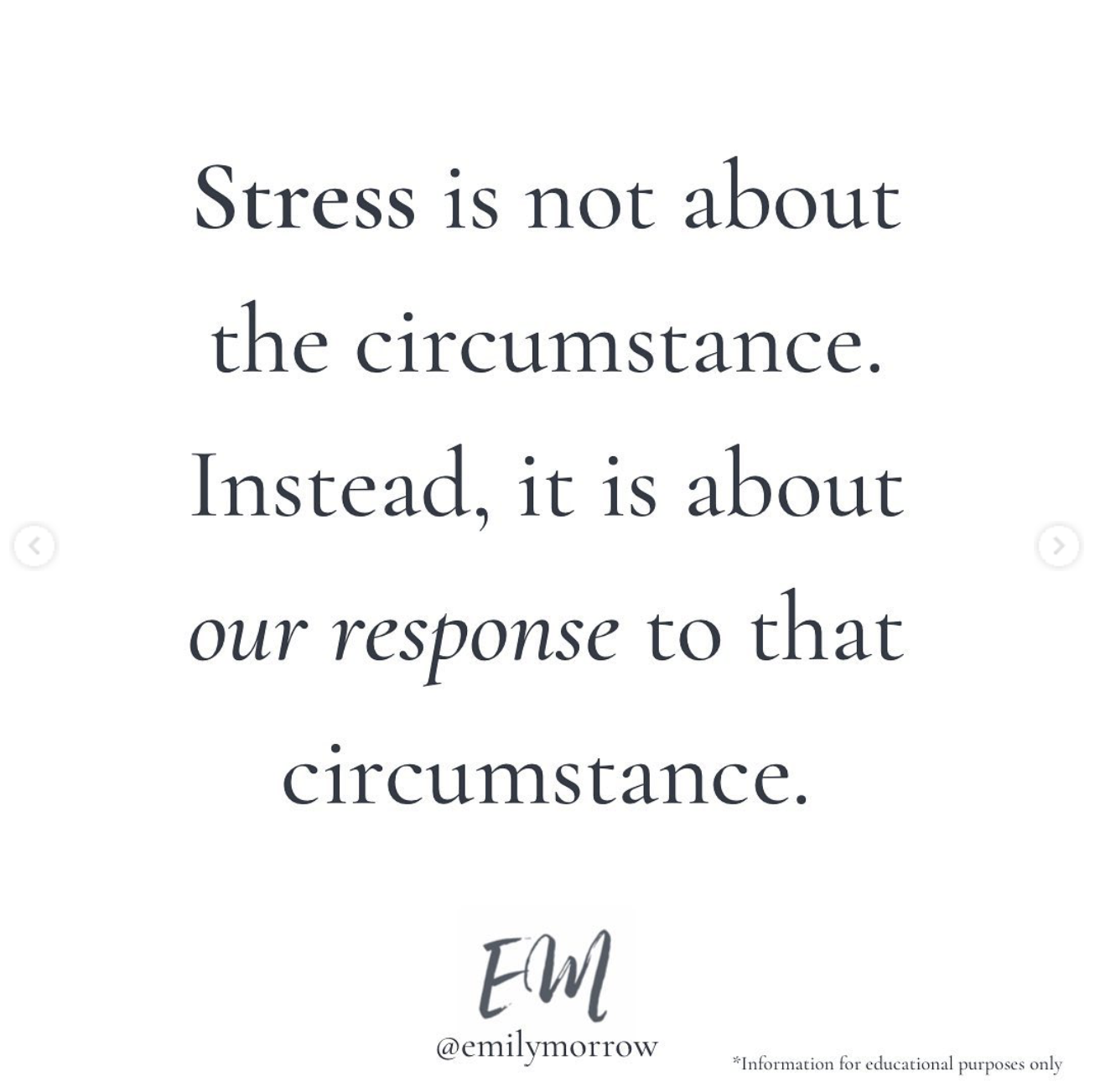
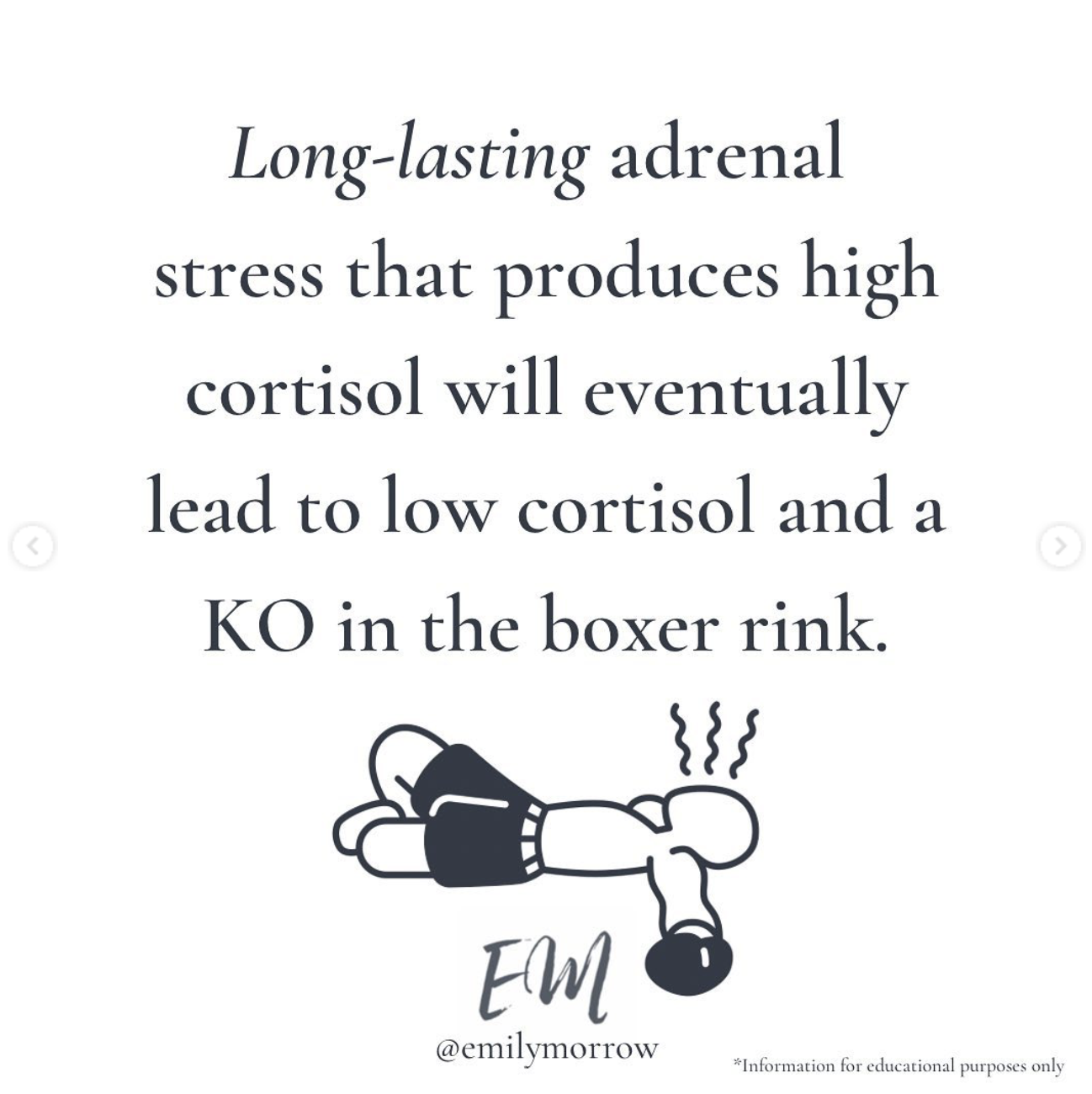
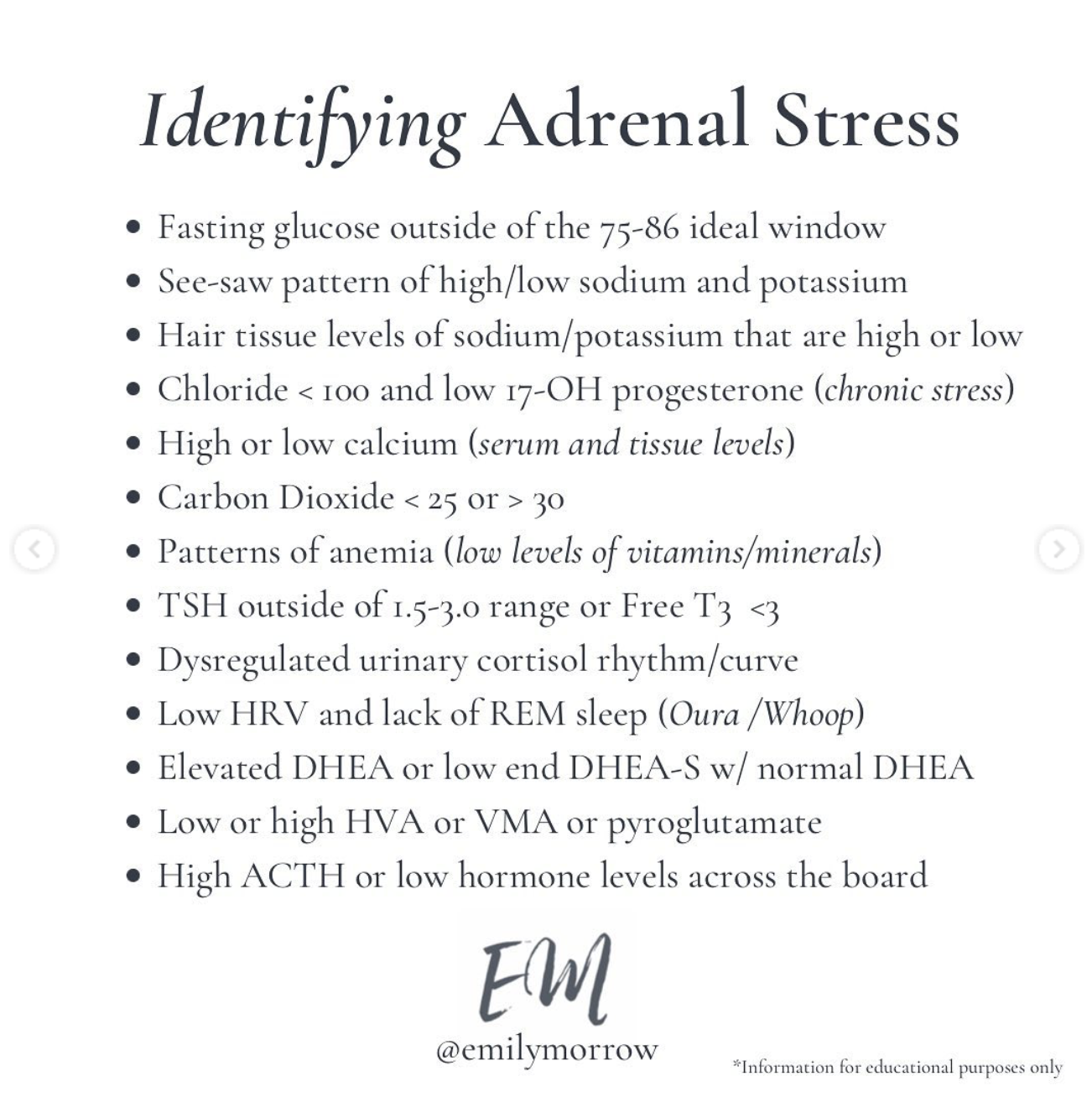
Signs of Adrenal Issues
Some symptoms of an adrenal issues include:
Quick to frustration
Fatigue
PMS/moodiness
Lower belly fat
Overwhelm/burn out
Bloating/poor digestion
Dizziness upon standing
Light sensitivity (need sunglasses)
Overly hot or cold
Low libido
Tired upon waking
Brain fog
Anxiety/ depression
Chemical sensitivities
Salt/sugar cravings
Joint pain
3 pm slump
Ongoing infections
Hair loss/thinning
Blood sugar swings
Poor memory/sleep
Histamine intolerance/ allergies
Lower belly fat (cortisol belly)
Ongoing chronic infection loads hair loss/thinning
Blood sugar swings
Poor memory
Tired and wired feeling
Blurry vision
Histamine intolerance/ allergies
Identifying Adrenal Stress
Fasting glucose outside of the 75-86 ideal window
See-saw pattern of high/low sodium and potassium
Hair tissue levels of sodium/potassium that are high or low
Chloride < 100 and low 17-OH progesterone (chronic stress)
High or low calcium (serum and tissue levels)
Carbon Dioxide < 25 01 > 30
Patterns of anemia (low levels of vitamins/minerals)
TSH outside of 1.5-3.0 range or Free T3 <3
Dysregulated urinary cortisol rhythm/curve
Low HRV and lack of REM sleep (Oura /Whoop)
Elevated DHEA or low end DHEA-S w/ normal DHEA
Low or high HVA or VMA or pyroglutamate
High ACTH or low hormone levels across the board
Causes of Adrenal Issues
Chronic stress has the potential to derail every single system and organ in our body. At the root of all disease and chronic inflammation is a "stressor". A stressor can be from things like infections, viruses, mold and parasites, sure, but more often than not, it is the day in and day out result of our mental and emotional health and well being. And unfortunately, this is the area most people have not addressed or worked through.
Stress in small amounts is okay. In fact, its needed. It is what helps wake us up in the morning and build muscle. It is the ongoing, recurring stressors that lead to chronic stress and decrease our bodies ability to heal (parasympathetic state).
Stress can literally shut down our body's production of digestive enzymes, lead to poor absorption of nutrients, constipation, bloating, weight challenges and poor detoxification. It can significantly throw off blood sugar and alter sleep patterns and mood.
While there may be in depth work to do to rid your body of physical stressors, such is life. Life is ALWAYS going to add some layer of stress. Ultimately it's how we choose to think about the stress and handle it.
Excess stressors (type and duration matters); a few common examples:
Under-eating or yo-yo dieting
Over exercising
Mental stressors, ongoing
Wonky blood sugar
Poor sleep or lack of sleep
Chronic infection load
Excess toxins in environment, makeup, lotions, processed foods, etc.
The news/social media
Lack of sunshine
Negative self talk and worry
Uncontrollable factors— such as death of a loved one, injuries, current/past trauma
Heavy metals— cadmium, lead, aluminum, mercury, etc. are deleterious to the mitochondria and can place a burden on the adrenals
Mold exposure/living in mold
EMF exposure
Adrenal Supports
Holy Basil
Rhodiola Rosea
Schisandra
Camu Camu
Adrenal Glandular
Evening and morning routine; having a consistent sleep/wake schedule
Daily habits and boundaries
Breathwork
Balance blood sugar (helpful to track to learn your trends)
Walking and smart exercise (not overdoing it)
Eat well and enough; avoid excessive fasting (especially in child bearing years)
Limit excess caffeine
Support the vagus nerve
Turn off devices before bed
Reduce EMF Exposure
Add in adrenal cocktails (low sugar recipes)
Use blue light blocking glasses
Add in more rest and play
Add in high quality sources of animal protein
The sauna decreases cortisol while increasing your serotonin levels. It also relaxes your muscles and releases tension throughout your body.
*A Doctor's advice should be sought before using any supplemental dietary product. These statements have not been evaluated by the FDA. These products and educational information is not intended to diagnose, treat, cure or prevent any disease.



